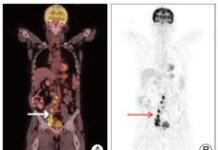A randomised, multicentre, phase II ECOG-ACRIN E2211 study of patients with advanced progressive pancreatic neuroendocrine tumours (NETs) met primary endpoint as treatment with temozolomide and capecitabine resulted in a prolonged median progression-free survival (PFS) compared to temozolomide alone (22.7 months versus 14.4 months). This clinically and statistically significant improvement in PFS with temozolomide and capecitabine is encouraging when analyzing the treatment landscape for patients with progressive pancreatic NETs. The response rate (RR) of 39.7% with temozolomide and capecitabine is higher than with other available treatments. In addition, the study investigators found that methylguanine methyltransferase (MGMT) deficiency is associated with tumour response. The study findings are reported by Dr. Pamela L. Kunz of the Yale Cancer Center in New Haven, CT, US and study colleagues on 19 October 2022 in the Journal of Clinical Oncology.
The authors reported in the background that patients with advanced pancreatic NETs have few treatment options that yield objective radiographic tumour regression. Prospective studies evaluating everolimus and sunitinib in this patient population have demonstrated prolonged PFS compared to placebo; however, RRs with these agents are less than 10%. 177Lu-DOTATATE, a novel radiopeptide, is approved for use in gastroenteropancreatic NETs based on both, the randomised NETTER-1 study in midgut NETs and retrospective studies in pancreatic NETs. However, it has not been formally evaluated in prospective randomised clinical studies in patients with pancreatic NETs, therefore limiting an accurate estimate of PFS.
Recent retrospective series and small, prospective phase II studies suggest that temozolomide is similarly active, but less toxic than streptozocin-based treatment in patients with pancreatic NETs. Additionally, temozolomide has been investigated prospectively in patients with NETs in small phase II combination studies. Studies evaluating single-agent capecitabine are limited to retrospective or small prospective studies and show little to modest activity. However, pre-clinical and early clinical evidence suggest that capecitabine may be synergistic with temozolomide, perhaps by downregulating the DNA-repair enzyme, MGMT.
Furthermore, temozolomide, like streptozocin, is an alkylating agent that induces DNA methylation at the O6 position of guanine leading to DNA damage and cell death, usually repaired by MGMT. In glioblastoma, MGMT is silenced by promoter methylation, rendering cells more sensitive to alkylating agents. However, in pancreatic NETs, other mechanisms may be involved with MGMT downregulation since promoter methylation seems to be less common, yet MGMT is still lost. In glioblastoma, MGMT promoter methylation testing has become routine as methylation confers a survival advantage and predicts response to temozolomide-based treatment. However, data from retrospective studies in pancreatic NETs have been mixed.
No prospective studies have evaluated the antitumour activity of temozolomide alone or in combination with capecitabine in pancreatic NETs. Temozolomide alone is considered a reference arm in this study based on the strength of prior retrospective and limited prospective data demonstrating activity with temozolomide containing regimens in NETs, and the inclusion of temozolomide in treatment compendia. In addition, this study explored whether MGMT deficiency, as determined by promoter methylation and/or immunohistochemistry (IHC), is associated with response to temozolomide-based treatment in patients with pancreatic NETs. As both arms contain temozolomide, this study was not designed to test MGMT as a predictive biomarker.
ECOG-ACRIN E2211 was a multicentre, randomised, phase II study comparing temozolomide versus temozolomide and capecitabibe in patients with advanced, low or intermediate grade pancreatic NETs. Key eligibility criteria included: progression within the preceding 12 months and no prior temozolomide, DTIC, capecitabine or 5-fluorouracil. The primary endpoint was PFS; secondary endpoints were overall survival (OS), RR, safety, and MGMT by IHC and promoter methylation.
In total, 144 patients were enrolled between April 2013 and March 2016 to temozolomide (72 patients) or temozolomide and capecitabine (72 patients). The primary analysis population included 133 eligible patients. At the scheduled interim analysis in January 2018, median PFS was 14.4 months for temozolomide versus 22.7 months for temozolomide and capecitabine (hazard ratio [HR] 0.58), which was sufficient to reject the null hypothesis for the primary endpoint (stratified log rank p = 0.022). In the final analysis in May 2021, median OS was 53.8 months for temozolomide and 58.7 months for capecitabine/temozolomide (HR 0.82, p = 0.42).
This study represents the first prospective analysis of MGMT by both IHC and promoter methylation in pancreatic NETs and demonstrated that MGMT deficiency, as defined by either low IHC or promoter methylation, is associated with tumour response. The absence of a non-temozolomide control arm precludes a definitive conclusion regarding whether MGMT deficiency is predictive. In addition, MGMT by promoter methylation is not sufficient to fully explain MGMT downregulation, as many more patients had low MGMT expression by IHC.
The authors commented that median PFS and RR observed with temozolomide and capecitabine are the highest reported in a randomised study for pancreatic NETs. MGMT deficiency was associated with response and, although, routine MGMT testing is not recommended, it can be considered for select patients receiving temozolomide when response is a primary goal of treatment. Additional investigation in future studies is warranted.
The authors concluded that these results suggest that the combination of temozolomide and capecitabine should be included as a standard treatment option for patients with advanced pancreatic NETs and is a reasonable comparator arm in future randomised studies. To this point, two follow-up NCTN studies have been developed to examine the role of temozolomide and capecitabine in other indications: a randomised phase II study of postoperative adjuvant temozolomide and capecitabine versus observation in high-risk pancreatic NETs (SWOG 2104) and a phase II randomised study of 177Lu-DOTATATE versus temozolomide and capecitabine in advanced well-differentiated pancreatic NETs (A022001).
This study was coordinated by the ECOG-ACRIN Cancer Research Group and supported by the National Cancer Institute of the US National Institutes of Health awards. The authors acknowledged funding from the Goldhirsh-Yellin Foundation for the correlative analyses.
Reference
Kunz PL, Graham NT, Catalano PJ, at al. A Randomized Study of Temozolomide or Temozolomide and Capecitabine in Patients with Advanced Pancreatic Neuroendocrine Tumors (ECOG-ACRIN E2211). JCO; Published online 19 October 2022. DOI: 10.1200/JCO.22.01013








